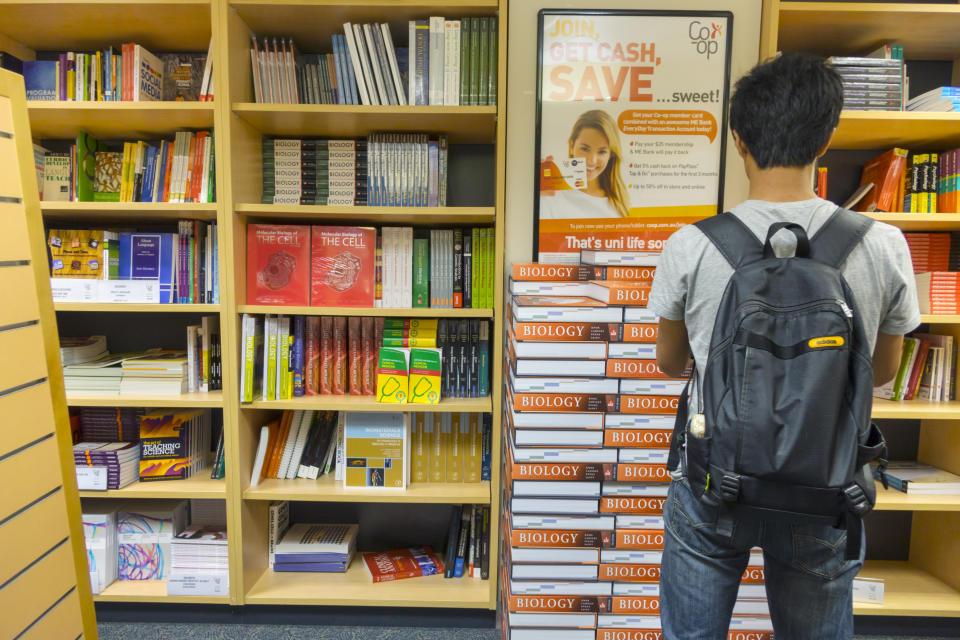Lawsuit alleges college textbook publishers conspired to 'monopolize the market'
A new antitrust class action lawsuit alleges that textbook publishers and on-campus college chain bookstores conspired to monopolize the textbook market, forcing students to pay higher-than-market prices for course materials.
Plaintiffs argue that publishers built the “Inclusive Access” model — a digital textbook market in collaboration with top publishers ostensibly aimed at reducing the cost of course materials — “to monopolize the market for textbooks in Inclusive Access classes and thereby raise prices, are actionable violations of the federal antitrust laws.”
Singling out the big three publishers — Cengage, Pearson and McGraw-Hill, as well as on-campus bookstore chains — the lawsuit filed in a New Jersey federal court argues that the practice is illegal under the Sherman Antitrust Act and the Clayton Antitrust Act.

“This suit by a student standing up for all of her peers against the the potential harms of Inclusive Access … and ultimately, like these, this suit could affect every student in America,” Kaitlyn Vitez, higher education campaign director for the progressive non-profit U.S. PIRG Education Fund, told Yahoo Finance. “We're talking about a really huge segment of America's college population.”
The textbook market — which Vitez previously called a “broken marketplace” — has been dominated for decades by a few dominant publishers that leverage deep expertise in educational materials and relationships with universities. Vitez said that the lawsuit “has the potential to really shake up the publishers’ plans to eliminate the used textbook market.”
Textbooks - Filed Complaint by Aarthi on Scribd
‘Pearson stands by the Inclusive Access model’
While the amount of money an average college student spends on textbooks has declined slightly in recent years, the lawsuit contends that the publishers’ introduction of an online model has resulted in the loss of choice.
“Inclusive Access increases students’ costs and eliminates their choices in order to increase the profits of textbook publishers and on-campus college bookstore retail chains,” the lawsuit asserts.
In response to this story, textbook publishers defended the model.
“We believe Inclusive Access benefits students by making our first-class instructional materials available to them at below competitive rates, and we believe the lawsuit has no factual or legal merit,” a McGraw-Hill spokesperson said in a statement.
A Pearson spokesperson said: “Pearson is aware of this lawsuit and is reviewing the complaint. Pearson stands by the Inclusive Access model, which offers real benefits to students, instructors and institutions.”
“Cengage is prepared to defend vigorously against these allegations,” a spokesperson from the company stated. “Cengage has been and remains a forceful advocate for student and textbook affordability.”

‘That’s gas money’
Online textbooks in the “Inclusive Access” model sometimes come with access codes to quizzes, homework assignments, and even exams. Some of the prices of the textbooks can run pretty steep, and in many cases, students can’t rely on a used textbook at cheaper rates.
Publishers emphasize that there’s always an “opt-out” option. But schools sometimes sign up for these textbooks in advance to secure discounted rates from the publishers and, in some cases, tacking that cost on to their students’ tuition and fees.
20-year-old University of North Carolina at Pembroke student Jorge Castillo told Yahoo Finance that as part of his school’s pilot program to increase students’ access to education materials, “one of the classes … had automatically charged me for a book. And this book — I already had bought it before.”
Castillo added that “the book that I had bought before was 50% cheaper than the book that was automatically charged to my fees. They charged me $45 on tuition and fees. Doesn't sound like a tremendous amount, but in reality, if I can get a book for $20 on Amazon, that’s gas money and money I can use for other [things].”
Follett, the company running the program, insisted that an “opt out” feature allowed students like Castillo were free to do so and buy alternative course materials at a cheaper rate.
But Castillo said it wasn’t that simple.
“It’s not easy to opt out,” he said. “So for instance, I have my school email and they sent it to another email that I normally don't use… that I had in high school.”
—
Aarthi is a writer for Yahoo Finance. She can be reached at aarthi@yahoofinance.com. Follow her on Twitter @aarthiswami.
Read more:
'The textbook market is broken' and the latest mega-merger makes it worse
New startup aims to help student loan borrowers declare bankruptcy
'Bilking taxpayers': Warren demands $22 million owed by student loan servicer Navient
Student loan servicer appeals landmark $220,000 bankruptcy ruling
Read the latest financial and business news from Yahoo Finance
Follow Yahoo Finance on Twitter, Facebook, Instagram, Flipboard, SmartNews, LinkedIn, YouTube, and reddit.

